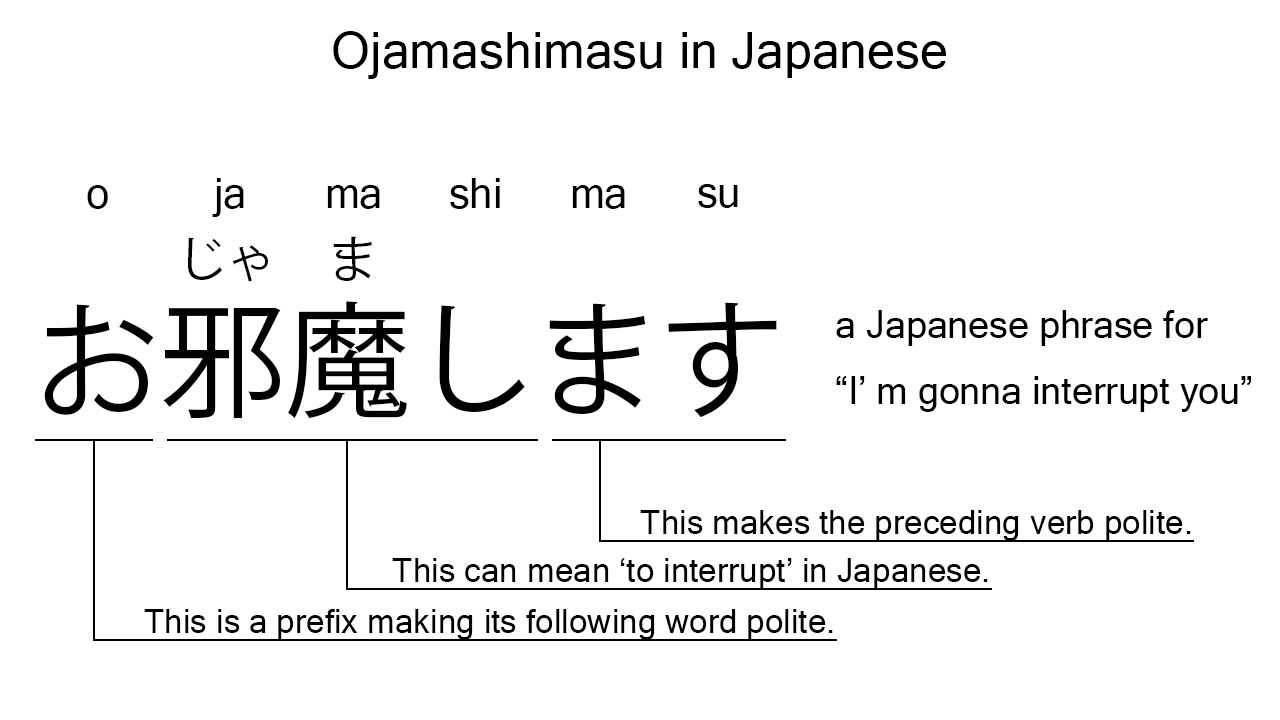What does “ojamashimasu” mean in Japanese?
When Japanese people enter someone’s room or house, they would say “ojamashimasu” to mean ‘thank you for inviting me’, ‘thank you for having me’, or such. They would also use this phrase to say ‘sorry to disturb you’ when they talk to someone or interrupt a conversation. In this blog post, I will explain this phrase in detail based on its grammatical components. And also, I will explain how to use it through an example sentence. My explanations would help Japanese learners understand “ojamashimasu” more clearly. Then, let’s get started!
Contents
- Definition and meanings of “ojamashimasu”
- What does “ojamashimasu” literally mean in Japanese?
- Summary
Definition and meanings of “ojamashimasu”
Let me start with the definition and meanings of “ojamashimasu”.
- ojamashimasu – お邪魔します (おじゃまします) : a Japanese phrase for ‘thank you for inviting me’, ‘thank you for having me’, ‘sorry to disturb you’, or such.
Japanese native speakers use this phrase typically in the following situations:
- When they enter someone’s room or house
- When they talk to someone while he/she is doing something
- Whey they want to interrupt a conversation
So, Japanese people use this phrase as a kind of greeting to inform others of their presence. In some cases, this phrase can be similar to even “excuse me”.
The definition and meanings are not that difficult, I think. To understand this phrase more clearly, however, let me explain its grammatical components in detail, one by one.
What does “ojamashimasu” literally mean in Japanese?
“Ojamashimasu” consists of the following three components:
- o – お : a prefix making its following word polite.
- jama shi – 邪魔し (じゃまし) : one conjugation of the verb, “jama suru”, which means ‘to interrupt’ or ‘to obstruct’ in Japanese. In the phrase, it has been conjugated for the better connection with its following word.
- masu – ます : an auxiliary verb used after a verb to make it polite. Probably, this is well known as a part of Japanese masu form. In the phrase, this is used after “jama shi” to make it sound polite.
From these three components, we can understand that the phrase is literally the polite form of “jama suru” which means ‘to interrupt’ in Japanese. And actually, it is. Native speakers use this phrase to say “I’m gonna interrupt you” politely in Japanese.

When we meet new Japanese phrases, we should check their grammatical components in detail to understand their meanings clearly and deeply. In many cases, components tell us a lot about the meanings of the phrases they form. Actually, here, we could get the better understanding of “ojamashimasu” through the detailed check above.
So far, I’ve explained the definition and meanings of “ojamashimasu” together with its grammatical components. Then, let me explain how to use it through the example sentence below.
Example #1: how to use “ojamashimasu”
o shigoto chuu ni ojamashimasu – お仕事中にお邪魔します (おしごとちゅうにおじゃまします)
Sorry for interrupting your work.
Below are the new words used in the example sentence.
- o – お : the same as used in “ojamashimasu”. In this example, this works to make “shigoto” sound polite.
- shigoto – 仕事 (しごと) : a noun meaning ‘work’ in Japanese.
- chuu – 中 (ちゅう) : a suffix used to mean ‘during’ or such. In the example, this is used after “o shigoto” to literally mean ‘during your work’.
- ni – に : a case particle used to say when something happens. In the example, this is used after “o shigoto chuu” to indicate the particular time when the speaker interrupts.
This is a typical usage of “ojamashimasu”. In this example, it works to mean ‘sorry for interrupting your work’ in Japanese. When we want to start a conversation in Japanese with someone who is doing his/her work, this phrase is a good option.
Example #2: the past tense form of “ojamashimasu”
ojamashimashita – お邪魔しました (おじゃましました)
Sorry to have interrupted you.
This is a typical usage of “ojamashimashita” which is the past tense form of “ojamashimasu”. Japanese native speakers use this past tense form as a kind of greeting when they leave someone’s room or house after finishing a conversation. “Ta” used here is an auxiliary verb to make the past tense form of its preceding verb, adjective, or auxiliary verb.
In this example, “ojamashimashita” has been translated as “sorry to have interrupted you”, but in most cases it corresponds well to the English phrase, “thank you for the conversation”, I think.
Summary
In this blog post, I’ve explained the definition and meanings of “ojamashimasu” in detail based on its grammatical components. And also, I’ve explained its usage and its past tense form. Let me summarize them as follows.
- ojamashimasu – お邪魔します (おじゃまします) : a Japanese phrase for ‘thank you for inviting me’, ‘thank you for having me’, ‘sorry to disturb you’, or such. This is literally the polite form of “jama suru” and thus politely means ‘I’m gonna interrupt you’ in Japanese. Japanese people use this phrase whey they enter someone’s room or house or when they talk to someone or when they interrupt a conversation.
- ojamashimashita – お邪魔しました (おじゃましました) : the past tense form of “ojamashimasu”. Japanese people use this past tense form when they leave someone’s room or house after finishing a conversation.
Hope my explanations are understandable and helpful for Japanese learners.
Leave a Reply